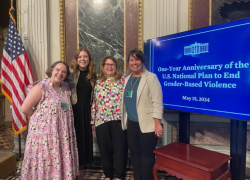Gender-based violence and harassment (GBVH) in the world of work is a whole-of-society issue with harmful im pacts on workers’ safety and economic security, as well as equity and cultural progress. Workers’ voices and experiences must be at the center of any solution to address and prevent GBVH because workers have a firsthand understanding of the culture and challenges in their industries and workplaces. The most effective interventions are those led by workers who are disproportionately impacted by GBVH, including women workers, in conjunction with unions, employers and government representatives. Unions can and should play a key role in ending GBVH: Unions create spaces where workers can come together to share and address concerns, driving progress in changing the culture that perpetuates GBVH.
pacts on workers’ safety and economic security, as well as equity and cultural progress. Workers’ voices and experiences must be at the center of any solution to address and prevent GBVH because workers have a firsthand understanding of the culture and challenges in their industries and workplaces. The most effective interventions are those led by workers who are disproportionately impacted by GBVH, including women workers, in conjunction with unions, employers and government representatives. Unions can and should play a key role in ending GBVH: Unions create spaces where workers can come together to share and address concerns, driving progress in changing the culture that perpetuates GBVH.
Here are four worker-centered strategies that unions can use to address and prevent GBVH in the world of work:
Raise awareness and gather information about the scope and incidents of GBVH in the world of work.
One of the most effective steps a union can take to address GBVH is to undertake participatory research where member volunteers who have witnessed or experienced GBVH work alongside union representatives to develop a confidential and voluntary survey tool that gathers information from colleagues about how GBVH is manifesting in their workplace. It’s critical for workers to co-create the surveys to ensure that the questions are reflective of the worker experience. Vitally, surveys should be voluntary and protect the confidentiality of those who choose to complete them. Survey results and data are a powerful tool in advocating for culture change and safer working conditions because they reveal how pervasive GBVH is in the relevant occupation and where to focus mitigation efforts.
Example: Women members of UNITE HERE Local 1 conducted participatory research interviews with 500 of their peers working in hotels and casinos in Chicago. The survey questions were created by the women workers. The aim of this research was to better understand the experience of women workers in Chicagoland hotels and hear directly from workers what might make them feel safer on the job. During these interviews, workers shared specific examples of the GBVH they had been experiencing in hotels. The researchers found that 58% of women hotel workers and 77% of women casino workers surveyed had been sexually harassed by a guest. These results raised the awareness of union leadership about the prevalence of the abuse and the need to prioritize GBVH in collective bargaining agreements and local legislation. Subsequently, UNITE HERE Local 1 launched the “Hands Off Pants On” campaign to advocate for greater protections for hotel workers, which led to the adoption of a Chicago ordinance requiring hotel housekeepers to have access to panic buttons when cleaning rooms—a solution the workers came up with themselves.
Adopt a policy resolution in support of ending GBVH in the world of work at your convention.
Unions commonly adopt policy resolutions at their conventions to address priorities that their members have identified. Adopting resolutions centered on addressing GBVH can lay the foundation for targeted actions and hold the union accountable for completing those actions.
Example: In June 2022, at their International Convention, the AFL-CIO adopted Resolution 8 on promoting gender equity. This resolution laid out the union’s commitment to “combat gender-based harassment and violence in the workplace” and to advocate for the implementation of International Labor Organization Convention 190, the first global standard on ending violence and harassment in the world of work. The resolution also mentions the U.S. National Plan to End Gender-Based Violence and committed the AFL-CIO to addressing the root causes of workplace violence and harassment.
Negotiate collective bargaining agreements and contract language inclusive of GBVH protections.
One of the most powerful tools that a union possesses is the right to collective bargaining, by which they can enshrine tangible and sustainable protections and resources for workers into contracts. Incorporating protections from and interventions to address GBVH into contracts is a key strategy that unions can use to ensure that their members are working in safe and equitable environments.
Example: UNITE HERE has had recent success in their bargaining with institutional food service employers. The union won stronger language on sexual harassment, intimate partner violence protections for workers, and the rights of transgender and non-binary workers in contracts with three of the largest food service employers in the United States: Sodexo, Compass Group and Aramark. These stronger protections are built into agreements covering more than 50,000 workers.
In 2018, the Women of Steel of the United Steelworkers (USW) released a call to action with several ways the union could work to address GBVH in the workplace. This included making it a union priority to negotiate stronger contract provisions addressing violence and harassment, such as access to leave for members experiencing domestic violence. In 2023, USW reported that its bargaining committees won their fight to include language on domestic violence leave in recent contracts covering thousands of members in the steel, paper, tire and rubber, health care and other major sectors. Additionally, USW members fought to secure domestic violence leave language in the union’s contracts with two major steelmakers in the U.S.
Host frequent, in-person trainings for leadership and members.
Training on GBVH in the world of work can help change an organization’s culture. Effective trainings are in-person, trauma-informed, worker-centered and co-created with workers. They occur at least once per year for all employees and should be conducted by experienced trainers who have expertise in addressing GBVH and creating trauma-informed, survivor-centered spaces. Unions also have the ability to advocate for widespread, comprehensive training across industries through legislative action.
Example: California passed the Janitor Survivor Empowerment Act (AB 547) in 2019, requiring that all janitors in California receive sexual violence prevention training from fellow janitors who have been certified as trainers and counselors. Having peers provide training is an effective way to ensure worker experiences are centered and to build worker trust. This legislation was the direct result of years of advocacy from workers in the industry alongside their union, SEIU United Service Workers West, to codify protections against GBVH into law for all janitorial workers in California. Many of these workers now lead the Ya Basta! Center and are peer trainers for the required sexual violence and harassment prevention training.
Kate Miceli and Amy Dalrymple are Policy Analysts at the U.S. Department of Labor Women’s Bureau.

 U.S. Department of Labor Blog
U.S. Department of Labor Blog





